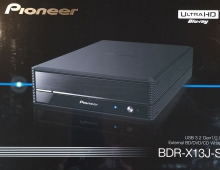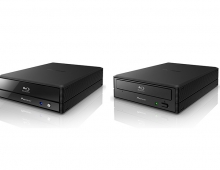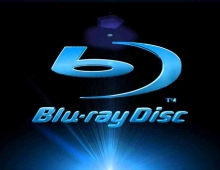
DreamStream to Encrypt RDM Format, a Blu-ray "Competitor"
DreamStream has signed on to encrypt Royal Digital Media's new optical media format; a "new" red-laser HD format that matches the description of the NME's High Definition Versatile Multilayer Disc (HD VMD).
The agreement will allow Royal Digital Media (RDM) to employ DreamStream's encryption in the copyright protection of their high-definition discs.
"DreamStream and RDM's technologies align perfectly, as they both rest exponentially beyond the standards currently being employed," said DreamStream's Chief Development Officer Ulf Diebel, in a statement issued at the signing in Paris.
DreamStream is the first company to implement a 2,048-bit encryption in consumer media. AES encryption, used in Sony's Blu-ray discs, uses a 128-bit system.
"In 2006, a hacker known as "Muslix64" defeated Blu-ray's encryption. Since that time, Sony's system has been faced with continual security breaches and tremendous losses due to piracy," said DreamStream in a statement.
The incorporation of DreamStream's encryption into RDM's system will thwart the piracy of digital content, the company claims, since the content of RDM's discs will only be able to be read by RDM's players.
RDM claims that it has developed a high-definition system that exceeds the capabilities of Blu-ray, at least in terms of capacity. RDM's technology offers storage capacity for up to 100 GB on a single disc.
"RDM's format will transform perceptions of high-definition," said DreamStream's Chief Development Officer Ulf Diebel. "RDM's system is able to display the next generation of high-definition: 1920p. With this advancement in technology, true digital cinema will soon be a widespread reality."
RDM's increase in storage capacity could allow for a single disc to hold approximately four hours of video content at 1920p resolution.
RDM's system is based on inexpensive red laser technology and RDM believes that their players will sell for much less than Sony's Blu-ray.
The retail prices for RDM's players and discs are expected to "equal those of the traditional DVD format, greatly undercutting Blu-ray," said Diebel.
"The mission of RDM is to replace traditional DVD technologies with a comprehensive, next generation HD system," said Eugene Levich, RDM's chief executive officer. "The industry's problem, which Sony has been unable to solve with Blu-ray, is how to transition into HD without destroying the existing DVD industry or gouging the pocketbooks of consumers. We have the solution and can solve this without having to drastically overhaul the entire infrastructure of DVD production."
For the record, Mr Eugene Levich has been the Chief Technology Officer of New Medium Enterprises, a London-based company who had promoted the High Definition Versatile Multilayer Disc (HD VMD) format some years ago.
RDM's technology can be implemented into existing DVD production processes through the integration of a proprietary software and firmware system. The only potential hardware modification is, "at most, the simple replacement of a single chip," said Levich. As such, existing DVD manufacturers will be able to integrate RDM's technology with only minor modifications to their production processes.
RDM's players are backwards compatible and able to read traditional CDs and DVDs. Moreover, data processing enables RDM's players to "drastically enhance the playback quality of regular DVD content," said Diebel.
RDM's format is scheduled to become publically available by the beginning of 2009. Two retailers have already placed orders for the first run of RDM's players, RDM said.
"DreamStream and RDM's technologies align perfectly, as they both rest exponentially beyond the standards currently being employed," said DreamStream's Chief Development Officer Ulf Diebel, in a statement issued at the signing in Paris.
DreamStream is the first company to implement a 2,048-bit encryption in consumer media. AES encryption, used in Sony's Blu-ray discs, uses a 128-bit system.
"In 2006, a hacker known as "Muslix64" defeated Blu-ray's encryption. Since that time, Sony's system has been faced with continual security breaches and tremendous losses due to piracy," said DreamStream in a statement.
The incorporation of DreamStream's encryption into RDM's system will thwart the piracy of digital content, the company claims, since the content of RDM's discs will only be able to be read by RDM's players.
RDM claims that it has developed a high-definition system that exceeds the capabilities of Blu-ray, at least in terms of capacity. RDM's technology offers storage capacity for up to 100 GB on a single disc.
"RDM's format will transform perceptions of high-definition," said DreamStream's Chief Development Officer Ulf Diebel. "RDM's system is able to display the next generation of high-definition: 1920p. With this advancement in technology, true digital cinema will soon be a widespread reality."
RDM's increase in storage capacity could allow for a single disc to hold approximately four hours of video content at 1920p resolution.
RDM's system is based on inexpensive red laser technology and RDM believes that their players will sell for much less than Sony's Blu-ray.
The retail prices for RDM's players and discs are expected to "equal those of the traditional DVD format, greatly undercutting Blu-ray," said Diebel.
"The mission of RDM is to replace traditional DVD technologies with a comprehensive, next generation HD system," said Eugene Levich, RDM's chief executive officer. "The industry's problem, which Sony has been unable to solve with Blu-ray, is how to transition into HD without destroying the existing DVD industry or gouging the pocketbooks of consumers. We have the solution and can solve this without having to drastically overhaul the entire infrastructure of DVD production."
For the record, Mr Eugene Levich has been the Chief Technology Officer of New Medium Enterprises, a London-based company who had promoted the High Definition Versatile Multilayer Disc (HD VMD) format some years ago.
RDM's technology can be implemented into existing DVD production processes through the integration of a proprietary software and firmware system. The only potential hardware modification is, "at most, the simple replacement of a single chip," said Levich. As such, existing DVD manufacturers will be able to integrate RDM's technology with only minor modifications to their production processes.
RDM's players are backwards compatible and able to read traditional CDs and DVDs. Moreover, data processing enables RDM's players to "drastically enhance the playback quality of regular DVD content," said Diebel.
RDM's format is scheduled to become publically available by the beginning of 2009. Two retailers have already placed orders for the first run of RDM's players, RDM said.





















